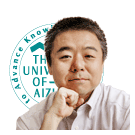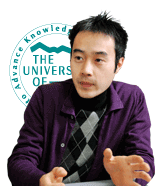Computer Systems
Students who would like to be involved in building computers in their future are strongly recommended to take the courses, "Logic Circuit Design" and "Advanced Logic Circuit Design. "What you acquired in these courses will be useful when you work in the field of digital integrated circuit design, as these courses, specifically the latter, give you first hand practice on tools and integrated circuits in use in the real world. However, taking these courses is not sufficient. Logic circuit design is a first step for digital integrated circuit design. Knowledge before (e.g. definition of the relevant functions) and after (layout design; designing in which part of an actual integrated circuit a transistor device should be placed and how the device should be connected) learning logic circuit design is also necessary. So taking other related courses is recommended.
In addition, studying computers requires knowledge not only on integrated circuits, but on other devices (keyboards, etc.) and operating systems (Windows, etc.).Ultimately, if you take as many courses related to the field of computer systems as you can, you will gain real knowledge and skills for making computers.
Computer Systems and Related Courses
- Electronics
- Embedded Systems
- Parallel Computer System
- VLSI Design
- Advanced Logic Circuit Design
Computer Network Systems
I teach the course, "Computer Network Organization and Design," offered in the first semester for the fourth-year students of the
Computer Network Systems and Related Courses
- Network Security
- Network Programming
- Wireless Networking
- Computer and Network System Modeling and Simulation
Applications
 Keitaro Naruse, Professor
Keitaro Naruse, Professor
The ultimate goal of this course group for students is to become computer science professionals when they graduate from the Undergraduate Program. To attain this goal, students concentrate on learning three specialized fields, namely, "Robotics," "Virtual Reality and Human Interfaces," and "Biomedical Information Processing." However, fast-evolving technologies today make the technologies which used to be leading-edge five years outdated. Therefore, becoming an engineer or a system developer requires continuous study of new technologies.
Do you think it is pointless to learn specialized/technical knowledge then? That is not right. When you learn specialized/technical knowledge, you also learn how to apply such knowledge to actual information systems. So you do not have to worry about emerging technologies in the future, because the experience you gained here will exercise its value when you face unknown fields.
There is another thing that I would like to mention. For system development, we should not disregard the existence human beings. There is always someone at an IT terminal machine. It is us, human beings, who make our society work. You may associate "system development" with "programming." But system development is actually a pre-programming stage. Development of good systems hinges greatly on how to model human behaviors. Taking courses in this course group, you will be able to understand what I mentioned above.
Applications and Related Courses
- Artificial Intelligence
- Computer Graphics
- Image Processing
- Robotics and Automatic Control
- Human Interface and Virtual Reality
- Signal Processing and Linear System
- Sound and Audio Processing
- Geometory for Visual Computing
- Information Retrieval and Natural Language Processing
Software Engineering
 Rentaro Yoshioka, Professor
Rentaro Yoshioka, Professor
This course group focuses on acquisition of fundamental knowledge and skills necessary for software design, development, operation and maintenance. The courses are designed for students who have already acquired fundamental and specialized knowledge and skills regarding programming and data structure to learn software design and development approaches. Software has been good support for our life-styles, and is now essential for our society. Software will become important more than ever, in parallel with an increase in functions required for software and their complexity. The courses are recommended widely to those who are interested in any software-associated area.
To keep up with specifically rapid advancement in software engineering areas, this course group covers latest subjects, such as object-oriented design, development of Web applications, distributed systems, project management, etc., in addition to knowledge and skills that can serve as the backbone. The courses in this group are well-suited for students aspiring to work for IT companies or to become IT specialists including IT architects, consultants and project managers.
Software Engineering and Related Courses
- Web Engineering
- Advanced Software Engineering
- Software Studio
- Concurrent and distributed systems
- Introduction to Data Science with Python
- Introduction to Big Data Analytics
Other Courses
Other Courses
- Basic Knowledge Course on Staring Up Ventures I
- Basic Knowledge Course on Staring Up Ventures II
- Factories for Experiencing Starting Up Ventures
- SCCP
- Courses for the Information Technology Examination
- Career Design I
- Career Design II
- TOEIC Preparation Course
- Extracurricular Activity Course Ⅰ
- Extracurricular Activity Course Ⅱ
- ICT Ventures Startup and Management
- Graduate School Courses


